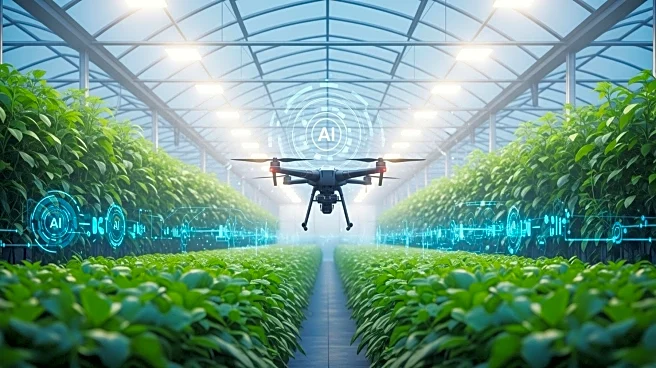What is the story about?
What's Happening?
The integration of generative AI into agriculture is transforming the sector, with the market expected to grow from USD 269.78 million in 2025 to USD 2,012.90 million by 2034. This growth is driven by trends such as precision farming, agricultural robotics, and machine learning analytics. North America leads the market with a 48% share, while Asia and Africa are seeing increased adoption of AI solutions tailored to smallholder farmers. Startups like Cradle Bio and Nexa Labs are at the forefront, innovating in areas like protein engineering and livestock management. These technologies offer significant returns on investment by increasing yields and reducing pest losses, although challenges such as high upfront costs and regulatory hurdles remain.
Why It's Important?
The adoption of generative AI in agriculture is crucial for addressing challenges posed by climate change, population growth, and resource scarcity. By optimizing resource use and enhancing productivity, AI technologies can significantly improve agricultural efficiency and sustainability. This shift towards data-driven farming practices not only benefits farmers by increasing profitability but also aligns with global sustainability goals. Investors are increasingly recognizing the potential of AI-driven agri-tech startups to disrupt traditional agricultural markets and deliver substantial returns.
What's Next?
As the market for generative AI in agriculture continues to expand, investors are likely to focus on startups that demonstrate innovation, scalability, and market readiness. The development of AI tools that can be adapted to various regional challenges will be crucial for widespread adoption. Regulatory frameworks will need to evolve to support the safe and effective use of AI in agriculture. Additionally, collaborations between tech companies and agricultural stakeholders will be essential for driving further advancements and ensuring that AI solutions are accessible to farmers worldwide.
Beyond the Headlines
The integration of AI in agriculture raises important ethical and regulatory considerations. Ensuring data privacy and security, particularly in the context of biometric data collection, will be a key concern. The potential for AI to exacerbate existing inequalities in access to technology and resources must also be addressed. Furthermore, the environmental impact of AI technologies, including their energy consumption and carbon footprint, will need to be carefully managed to ensure that they contribute positively to sustainability goals.















